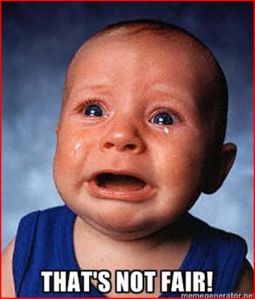 Are humans born with a sense of fairness built in from birth?
Are humans born with a sense of fairness built in from birth?
Originally it was thought that children go through three big developmental stages. Young kids (2 to 4 years old) are purely selfish, while older children (5 or 6) will follow a strict equality rule. When children become older (7 or 8) they start to consider the individual contributions of others. The thought being older children are more aware of their surroundings and less impulse driven.
A recent study finds that children will start to evaluate these contributions earlier than expected. Patricia Kanngiesser from the University of Bristol led and published a study about fairness starting in children at the age of three. She said:
“It seems to be intuitive, People have found that even by 18 months of age, children have expectations about how things should be shared fairly.”
The study was done by having a puppet and a child gather coins together in a bucket game. A puppet was used to make sure that the amount of work done by the child’s partner could be controlled. There were three rounds of experiments conducted.
- One where both child and puppet picked up the equal amount of coins.
- A second round where the child picked up more coins than the puppet.
- The last round the puppet picked up more coins than the child.
After each turn of the bucket game, the child took notice of how many coins both the puppet and themselves gathered. The child was then rewarded with six stickers to dole out between themselves and the puppet.
The study found that the children would share more stickers with the puppet based on how much effort they thought the puppet put forth. It’s pretty impressive that a child as young as three has the ability to assess work-contribution when giving out resources.
If children can have a sense of fairness at the incredibly young age of three, does this mean that other species have the same ability to know when they are being treated fairly?
Are we the only breed that understands fairness?
For many years people thought that humans were the only type of species to evaluate fairness. That was until Sarah F. Brosnan did an experiment on primates, focusing the brown Capuchin monkey. Researchers found that these monkeys eventually refused to participate if they witnessed another monkey obtain a better reward for equal effort; it would be more prevalent if the other monkey received such a reward without any effort at all.
Dogs also were found to have the trait of knowing when they were getting ripped off, though not to the level that the monkeys did. There was an experiment where dogs were given the task to “give paw” around another dog. When one of the dogs got rewarded for doing nothing, the other canine would start to act out. The unrewarded dog would start by taking longer to do the task they were being asked to do, and eventually just stop cooperating altogether. There wasn’t a deep level of thinking in the dogs when it came to fairness. When both dogs received a treat, though different in quality (like one receiving sausage and the other being a dark piece of bread) both dogs would continue to do the task asked without any issues.
Both babies and animals being able to show that they have a sense of fairness blows my mind. It’s something that I personally would never assume because I thought they both didn’t have the cognitive power to be able to tell what’s right from wrong. It also makes me wonder if it’s nature or nurture that makes some people tend to turn their back on fairness and go the easy or greedy route when it comes to day to day decision making.
Very interesting study.